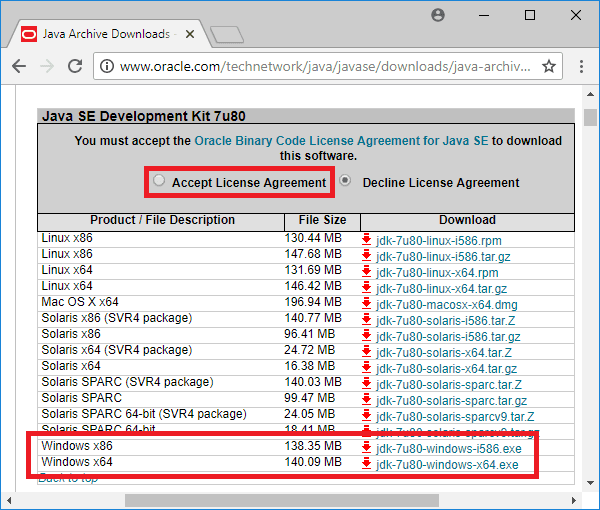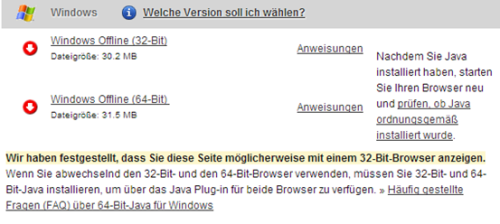Java 1.7 0 25 Download 32 Bit
See JDK 7 and JRE 7 Installation Guide for general information about installing JDK 7 and JRE 7.
For information on enhancements to JDK 7 that relate to the installer, see Installer Enhancements in JDK 7.
Java: 1.8.025, oracle free download. Seata Seata, or Simple Extensible Autonomous Transaction Architecture is an open source distributed transa. Backup 1.10.15 Java Runtime Environment (JRE) 32-Bit 7 Update 76 Java Runtime Environment (JRE) 64-Bit 7 Update 76 » Comment Rules & Etiquette - We welcome all comments from our readers, but any comment section requires some moderation. Java Runtime Environment 1.1.7 (2.61 MB) Java Runtime Environment 1.5.0.7 (18.23 MB). Download Java 6 Update 24. Java SE 6 update 25 brings faster server start. Download Description. This document lists IBM SDK, Java Technology Edition, Version 7 Release 1 packages that can be used with WebSphere Liberty. Java Runtime Environment (JRE) for Fedora (32-bit) provides the libraries, the Java Virtual Machine, and other components to run applets and applications written in the Java programming language.
Contents
Note: For RPM-based Linux distributions, such as Red Hat or SuSE, refer to the RPM-based installation instructions.
System Requirements
See Oracle JDK 7 and JRE 7 Certified Systems Configurations for information about supported platforms, operating systems, and browsers.
On a 64-bit system, you can download either the 64-bit or the 32-bit version of the Java platform. However, if you are using a 32-bit browser and you want to use the plugin, then you need to install the 32-bit version of the Java platform. To determine which version of Firefox you are running, launch the application, and select the menu item Help -> About Mozilla Firefox. At the bottom of the window is a version string line that contains either 'Linux i686' (32-bit) or 'Linux x86_64' (64-bit). To setup the Java plugin, see Manual Installation and Registration of Java Plugin for Linux.
JDK 7 Installation Instructions
Note: For any text on this page containing the following notation, you must substitute the appropriate JDK update version number for the notation. For example, if you are installing update JDK 7 update release 1, the following string representing the name of the bundle: would become:Note that, as in the preceding example, the <version> number is sometimes preceded with the letter u, for example, 7u2, and sometimes it is preceded with an underbar, for example, jdk1.7.0_02.
The following table lists the options available for downloading the JDK 7 release on a Linux platform. The link in the first column takes you to the instructions for that version.
| Download File | Architecture | Who Can Install |
|---|---|---|
| jdk-7u<version>-linux-x64.tar.gz | 64-bit | anyone |
| jdk-7u<version>-linux-i586.tar.gz | 32-bit | anyone |
| jdk-7u<version>-linux-x64.rpm | 64-bit RPM-based Linux | root |
| jdk-7u<version>-linux-i586.rpm | 32-bit RPM-based Linux | root |
Installation can be performed using either of the following:
- Installation of Oracle Linux JDK using archive binaries (
.tar.gz) allows you to install a private version of the JDK for the current user into any location, without affecting other JDK installations. However, it may involve manual steps to get some of the features to work (for example, the-version:release option of thejavacommand which allows you to specify the release to be used to run the specified class requires the correct path to the JDK release under /usr/jdk). - Installation of Oracle Linux JDK using RPM packages allows you to perform a system-wide installation of the JDK for all users, and requires root access. RPM-based Linux platforms are based on Red Hat and SuSE.
Note: When you download and install the Java Development Kit (JDK), the associated Java Runtime Environment (JRE) is also installed.
JDK 7u6 and later releases include JavaFX SDK (version 2.2 or later). The JavaFX SDK and Runtime are installed and integrated into the standard JDK directory structure.
For information about how to work with JavaFX, see JavaFX Documentation.
Installation of the 64-bit JDK on Linux Platforms
This procedure installs the Java Development Kit (JDK) for 64-bit Linux, using an archive binary file (.tar.gz).
These instructions use the following file:
Java 1.7 0 25 Download 32 Bits
1. Download the file. Before the file can be downloaded, you must accept the license agreement. The archive binary can be installed by anyone (not only root users), in any location that you can write to. However, only the root user can install the JDK into the system location.
2. Change directory to the location where you would like the JDK to be installed. Move the .tar.gz archive binary to the current directory.
3. Unpack the tarball and install the JDK.
The Java Development Kit files are installed in a directory called jdk1.7.0_<version> in the current directory.
The five people you meet in heaven free download. 4. Delete the .tar.gz file if you want to save disk space.
Installation of the 64-bit JDK on RPM-based Linux Platforms
This procedure installs the Java Development Kit (JDK) for 64-bit RPM-based Linux platforms, such as Red Hat and SuSE, using an RPM binary file (.rpm) in the system location. You must be root to perform this installation.
These instructions use the following file:
1. Download the file. Before the file can be downloaded, you must accept the license agreement.
2. Become root by running su and entering the super-user password.

3. Uninstall any earlier installations of the JDK packages.
4. Install the package.
To upgrade a package:5. Delete the .rpm file if you want to save disk space.
6. Exit the root shell. No need to reboot.
Installation of the 32-bit JDK on Linux Platforms
This procedure installs the Java Development Kit (JDK) for 32-bit Linux, using an archive binary file (.tar.gz).
These instructions use the following file:
1. Download the file. Before the file can be downloaded, you must accept the license agreement. The archive binary can be installed by anyone (not only root users), in any location that you can write to. However, only the root user can install the JDK into the system location.
2. Change directory to the location where you would like the JDK to be installed. Move the .tar.gz archive binary to the current directory.
3. Unpack the tarball and install the JDK.
The Java Development Kit files are installed in a directory called jdk1.7.0_<version> in the current directory.
4. Delete the .tar.gz file if you want to save disk space.
Installation of the 32-bit JDK on RPM-based Linux Platforms
This procedure installs the Java Development Kit (JDK) for 32-bit RPM-based Linux platforms, such as Red Hat and SuSE, using an RPM binary file (.rpm) in the system location. You must be root to perform this installation.
These instructions use the following file:
1. Download the file. Before the file can be downloaded, you must accept the license agreement.
2. Become root by running su and entering the super-user password.

Java 1.6.0.45 32 Bit Download
3. Uninstall any earlier installations of the JDK packages.
4. Install the package.
To upgrade a package:5. Delete the .rpm file if you want to save disk space.
6. Exit the root shell. No need to reboot.
General Installation Notes

Root Access
Installing the software automatically creates a directory called
jdk1.7.0_<version>. Note that if you choose to install the Java SE Runtime Environment into system-wide location such as /usr/jdk, you must first become root to gain the necessary permissions. If you do not have root access, simply install the Java SE Runtime Environment into your home directory, or a subdirectory that you have permission to write to. Overwriting Files
If you install the software in a directory that contains a subdirectory named jdk1.7.0_<version>, the new software overwrites files of the same name in that jdk1.7.0_<version> directory. Please be careful to rename the old directory if it contains files you would like to keep.System Preferences
Jdk 1.7.0 64 Bit Download
By default, the installation script configures the system such that the backing store for system preferences is created inside the JDK's installation directory. If the JDK is installed on a network-mounted drive, it and the system preferences can be exported for sharing with Java runtime environments on other machines.Java 1.7 0 25 Download 32 Bit 64
See the Preferences API documentation for more information about preferences in the Java platform.
Download Java 1.7.0 64 Bit
Java 1.7 0 25 Download 32 Bit Windows 7
|
| |||||||||||||||||||||||||||||||
| Disclaimer: This webpage is intended to provide you information about silent installation/uninstallation switches for software/applications. The information is provided 'As Is' without warranty of any kind. The links provided point to pages on the vendors' websites. You can get more information by clicking the links to visit the relevant pages on the vendors' websites. Desktop Central is NOT endorsed by any of those vendors. | ||||||||||||||||||||||||||||||||